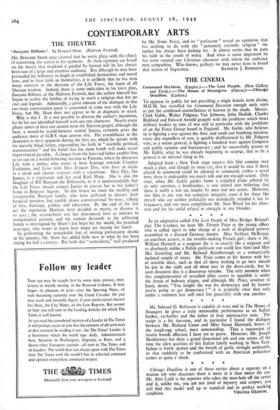THE CINEMA
Command Decision. (Empire.)—The Lost People. (New Gallery and Tivoli.)—The House of Strangers. (Odeon.)—Chicago Deadline. (Carlton.)
To appease its public for not providing a single female form divine, M.G.M. has corralled for Command Decision enough male stars to put the combined constellations of heaven in the shade. Messrs. Clark Gable, Walter Pidgeon, Van Johnson, John Hodiak, Charles Bickford and Edward Arnold grapple with the problems which beset military leaders in time of war and in particular with the problems of an Air Force Group based in England. Mr. Gable, who believes he is fighting a war against the Axis, and sends out bombing missions every day regardless of cost, is quickly disillusioned by Mr. Pidgeon who, as a senior general, is fighting a hundred wars against Congress and public opinion and bureaucracy ; and he successfully proves to Mr. Gable, what he was already beginning to suspect, that to be a general is an infernal thing to be.
Adapted from a New York stage success this film remains very much a play, and though its main cry, that it would be nice if those placed in command could be allowed to command, strikes a novel note, there is undeniably too much talk and not enough action. Only once, when Mr. Gable guides home a crippled plane piloted by its only survivor, a bombardier, is one stirred into believing that there is really a war on, fought by men and not actors. However, this film at any rate has complete integrity, even if for those like myself who are neither politically nor technically minded it has its longueurs, and one must compliment Mr. Sam Wood for his direc- tion and for his stolid refusal to smuggle in any blondes.
* * * *
In an adaptation called The Lost People of Miss Bridget Boland's play The Cockpit, we have Mr. Dennis Price as the young officer who is called upon to take charge of a mob of displaced persons assembled in a disused German theatre. Miss Siobhan McKenna, an excellent actress, is the trouble-making French girl ; there is Mr. William Hannell as a sergeant (he is so exactly like a sergeant and so absolutely unlike a Polish professor one could kiss him) and Miss Mai Zetterling and Mr. Richard Attenborough as a romantically inclined couple of strays. Mr. Price comes to his theatre with lots of sensible ideas, such as that all those wishing to go west should be put in the stalls and all those east in the dress-circle, but he soon discovers this is a disastrous mistake. The only moment when this conglomeration of so-called allies ceases to squabble is under the threat of bubonic plague, and although Mr. Price, revolver in hand, shouts "You fought the war for democracy and by heaven you're going to get democracy ! " it is painfully clear that only under a common fear will men live peaceably with one another.
* * * *
Mr. Edward G. Robinson is capable de tout, and in The House of Strangers he gives a truly memorable performance as an Italian banker, ex-barber and the father of four unattractive sons. The script is a bit tiresome, and in particular I found the dialogue between Mr. Richard Conte and Miss Susan Hayward, lovers of the tough-egg school, most unrewarding. That a succession of insults breeds affection I have yet to prove. However, Mr. Joseph Mankiewicz has done a grand directional job and one senses all the time the alien qualities of this Italian family working in New York. Italian is freely spoken and the breath of garlic strongly noticeable, so that suddenly to be confronted with an American policeman comes as quite a shock.
* * * *
Chicago Deadline is one of those stories about a reporter on a routine job who discovers there is more in it than meets the eye. Mr. Alan Ladd is the reporter who takes the man-hole off the sewer and if, unlike me, you are not tired of mystery and corpses, you will find this model well up to standard and in perfect working






























 Previous page
Previous page